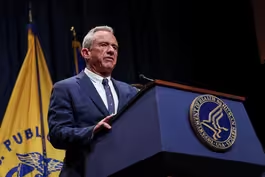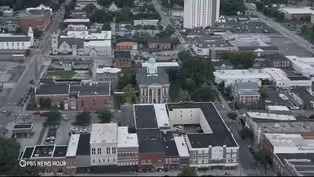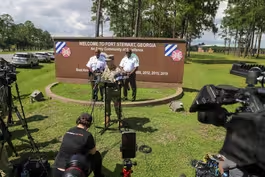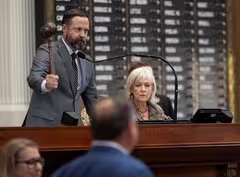
Former prosecutor questions legitimacy of Bondi Russia probe
Clip: 8/6/2025 | 10m 29sVideo has Closed Captions
Former prosecutor questions legitimacy of Bondi’s Russia probe
Attorney General Pam Bondi directed federal prosecutors to launch a grand jury investigation into accusations that members of the Obama administration manufactured intelligence about Russia’s 2016 election interference. Stephanie Sy reports on the latest development in the lengthy saga and Geoff Bennett discusses more with former prosecutor and intel official Steven Cash.
Problems playing video? | Closed Captioning Feedback
Problems playing video? | Closed Captioning Feedback
Major corporate funding for the PBS News Hour is provided by BDO, BNSF, Consumer Cellular, American Cruise Lines, and Raymond James. Funding for the PBS NewsHour Weekend is provided by...

Former prosecutor questions legitimacy of Bondi Russia probe
Clip: 8/6/2025 | 10m 29sVideo has Closed Captions
Attorney General Pam Bondi directed federal prosecutors to launch a grand jury investigation into accusations that members of the Obama administration manufactured intelligence about Russia’s 2016 election interference. Stephanie Sy reports on the latest development in the lengthy saga and Geoff Bennett discusses more with former prosecutor and intel official Steven Cash.
Problems playing video? | Closed Captioning Feedback
How to Watch PBS News Hour
PBS News Hour is available to stream on pbs.org and the free PBS App, available on iPhone, Apple TV, Android TV, Android smartphones, Amazon Fire TV, Amazon Fire Tablet, Roku, Samsung Smart TV, and Vizio.
Providing Support for PBS.org
Learn Moreabout PBS online sponsorshipGEOFF BENNETT: Attorney General Pam Bondi this week directed federal prosecutors to launch a grand jury investigation into accusations that members of the Obama administration manufactured intelligence about Russia's 2016 election interference.
That's according to multiple press reports.
It's the latest development in a lengthy saga which has reopened the door into one of the most contentious elections in American history.
Stephanie Sy has more.
STEPHANIE SY: On CNBC yesterday President Trump lauded his attorney general's latest reported move.
QUESTION: The Justice Department now tapping a grand jury to look into the intelligence community's assessment of what was happening with Russia.
Is that -- you have nothing to do with directing the Justice Department?
DONALD TRUMP, President of the United States: No, I have nothing to do.
Pam is doing a great job.
I have nothing to do with it.
I will tell you this.
They deserve it.
I was happy to hear it.
STEPHANIE SY: Multiple reports say Bondi has directed DOJ prosecutors to present evidence to a grand jury, evidence that allegedly shows Obama administration officials politicized intelligence reports about Russia's involvement in the 2016 election.
TULSI GABBARD, U.S. Director of National Intelligence: The implications of this are far-reaching.
STEPHANIE SY: National intelligence director Tulsi Gabbard last month released a series of documents.
She claimed they prove that the 2016 intelligence assessment had significant tradecraft failings and was unnecessarily rushed and subjected to inadequate review and coordination.
TULSI GABBARD: They knew it would promote this contrived narrative that Russia interfered in the 2016 election to help President Trump win, selling it to the American people as though it were true.
It wasn't.
STEPHANIE SY: The "they" Gabbard references includes former CIA Director John Brennan, former National Intelligence Director James Clapper and former FBI Director James Comey.
In a New York Times opinion article last week, Clapper and Brennan pushed back, writing: "That is patently false.
In making those allegations, they seek to rewrite history.
We want to set the record straight and in doing so sound a warning."
Gabbard's conclusions seek to cast doubt on previous findings that were reviewed and accepted by Democrats and Republicans, including Trump's current secretary of state, Marco Rubio, who was then vice chair of the Senate Intelligence Committee.
JOHN RATCLIFFE, CIA Director: All of this evidence that's been hidden and buried from the American people is finally coming to light.
STEPHANIE SY: The current CIA director, John Ratcliffe, in a FOX News interview also questioned the consensus that Russia wanted Trump to win in 2016, suggesting it was all a conspiracy.
JOHN RATCLIFFE: Pam Bondi does have a strike force.
It is a different Department of Justice, a different FBI, and an opportunity to look at how these people really did conspire to run a hoax, a fraud on the American people and against Donald Trump's presidency.
STEPHANIE SY: But if it was a conspiracy, his own first-term Attorney General Bill Barr didn't uncover it, a point made by the CNBC host.
QUESTION: Independent sources, even your Justice Department -- but then I'm bringing up Bill Barr, but even they decided that there wasn't - - there were things that happened, but nothing that would have swayed it.
DONALD TRUMP: Well, they were wrong, and Bill Barr was wrong, and Bill Barr didn't investigate, and he should have.
STEPHANIE SY: Meanwhile, Trump's current attorney general's latest move enables prosecutors to issue subpoenas and potentially indict the Obama era officials.
Last week, an Obama spokesperson called the claims outrageous, adding: "These bizarre allegations are ridiculous and a weak attempt at distraction."
In the background of all this, the storm over Trump's former relationship with Jeffrey Epstein.
Attorney General Bondi and the DOJ are under renewed pressure from Republican lawmakers to hand over documents related to the case.
So far, they have had no comment.
For the "PBS News Hour," I'm Stephanie Sy.
GEOFF BENNETT: For perspective, we turn now to Steven Cash, a former state prosecutor and veteran of the intelligence community with experience at the CIA on Capitol Hill and at the Department of Homeland Security.
He now serves as executive director of the Steady State.
That's an organization of more than 300 former intelligence and national security professionals who are sounding the alarm about threats to American democracy.
It's great to have you here.
STEVEN CASH, Former Intelligence Official: It's great to be here.
Thanks for having me.
GEOFF BENNETT: You have called this latest DOJ effort profoundly concerning.
You say it's a hallmark of autocratic regimes.
What specific red flags are you seeing in terms of how this investigation is unfolding?
STEVEN CASH: Well, most importantly and the flag that is most notable is that what we see is turning our security services and our law enforcement services inward, focusing on what appears to be enemies of the president to accomplish personal goals of the president.
We hear a lot, we just heard now, about fraud and conspiracy.
A lot of documents have been released, but it doesn't appear to be anything there that makes sense.
Bizarre is probably a pretty good word that the Obama office used in describing these.
But what's so scary is, what's happening here is what my organization and what intelligence officers and diplomats have seen overseas, which is a democracy sliding into an autocracy.
And it slides in part on skids of using whatever the Department of Justice is, the ministry of justice, the internal security services, the intelligence service.
All of that is terrifying.
GEOFF BENNETT: What do you say to critics who argue this is simply a long-overdue accountability effort?
How do you distinguish that from politicized retribution?
STEVEN CASH: Well, it's not long overdue.
We had a tremendous amount of accountability.
As was just mentioned, there was a special prosecutor, a formidable and very experienced prosecutor who spent literally years and millions of dollars investigating this, these allegations, found nothing.
That was signed off on by former Attorney General Barr.
The Senate Select Committee on Intelligence put out a report, five volumes, probably 15 pounds of paper, extensive investigation, extensive interviews, also found nothing.
So this isn't long overdue.
GEOFF BENNETT: What's the level of concern that analysts might start self-censoring or try to avoid altogether politically sensitive subjects like Russia, China, Iran?
What are the risks to national security if that happens?
STEVEN CASH: They're very significant.
First of all, if you're a decent analyst, everything you work on is important and political -- politically important.
There are no countries in the world that you would be wanting to write on that nobody cares about.
So it's everything.
And everybody's watching this.
If an analyst sits down to write about something that the White House has already voiced its opinion on, they're already seeing what happens if your analysis comes out different.
We saw members of the National Intelligence Council fired because they came out with a report on Venezuela that differed from what the president had said and it seems wanted to hear.
Same with Russia.
It is terrifying.
And many of the analysts were talking about, they're in their late 20s, mid-30s.
They have mortgages.
They have children.
They're worried.
This is terrifying.
And this level - - takes it up one level.
It's not only that you may lose your job.
It's that you may find yourself on the receiving end of a subpoena or visit from the FBI or in a grand jury.
GEOFF BENNETT: At this point, is there any institutional safeguard either inside the I.C.
or within the broader government that can withstand this kind of political pressure?
STEVEN CASH: I certainly hope so.
What do I think could withstand it?
One, there's a remarkable amount of resilience inside the intelligence community.
People don't really understand, I think, or have intimate understanding of how deeply people in the intelligence community care about the Constitution and civil rights and civil liberties.
They're totally bought in.
So there's going to be a -- there's going to be what is sometimes called the steady state.
That means people on the inside who are going to adhere to the law and follow it.
There's you and the media who are covering these stories and hopefully educating Americans.
This is a little bit of inside baseball which has now sort of spilled outside the Beltway, and now everybody in the United States needs to know what the NIC is.
I just threw out that acronym before.
You got to know what the NIC is if you're going to follow this story.
So there's an educational process here.
We have the courts, and hopefully we will have the Congress.
We don't seem to right now.
We don't see aggressive oversight by a Republican-dominated House or Senate.
But we need that.
That's what those committees are for.
GEOFF BENNETT: I almost always resist the urge to speculate.
But, in this case, since we have you here, if indictments emerge, what precedent does that set for handling politically charged investigations into intelligence operations?
STEVEN CASH: Well, what we could end up is what we have seen in other autocratic countries is, when the power center shifts through an election or a coup, what often happens is, the new leader takes out his national security people and they get purged.
In some places, they get purged and shot.
It transforms the institutions that are here to protect us, the CIA, the FBI, the entire intelligence community, the Department of Justice.
It transforms them into tools of who's ever sitting in the Oval Office.
And that means, when the Oval Office chair changes, those tools change the direction for which they're used.
But it doesn't seem or it could be difficult to get out of a cycle where those tools are always pointed inward.
They're designed to protect us from outside adversaries, other countries who could do us harm, terrorists, not political enemies.
GEOFF BENNETT: Steven Cash, thank you for this conversation and for your insights.
STEVEN CASH: It's a pleasure.
It's a pleasure.
GEOFF BENNETT: Steven, we appreciate it.
STEVEN CASH: Thank you.
Composer reimagines Harvey Milk opera while rebuilding life
Video has Closed Captions
Clip: 8/6/2025 | 7m 46s | Composer reimagines his Harvey Milk opera while rebuilding life after traumatic injury (7m 46s)
Expert says mRNA funding cut is 'dangerous' health decision
Video has Closed Captions
Clip: 8/6/2025 | 7m 51s | Federal mRNA funding cut is 'most dangerous public health decision' ever, expert says (7m 51s)
How a county is using AI to help people find common ground
Video has Closed Captions
Clip: 8/6/2025 | 9m 1s | How a Kentucky community is using AI to help people find common ground (9m 1s)
News Wrap: Army sergeant accused of shooting 5 soldiers
Video has Closed Captions
Clip: 8/6/2025 | 7m 17s | News Wrap: Army sergeant accused of shooting 5 soldiers at Fort Stewart (7m 17s)
Politicians pick their voters with partisan redistricting
Video has Closed Captions
Clip: 8/6/2025 | 10m 18s | How politicians are picking their voters with partisan redistricting (10m 18s)
Providing Support for PBS.org
Learn Moreabout PBS online sponsorshipSupport for PBS provided by:
Major corporate funding for the PBS News Hour is provided by BDO, BNSF, Consumer Cellular, American Cruise Lines, and Raymond James. Funding for the PBS NewsHour Weekend is provided by...
















